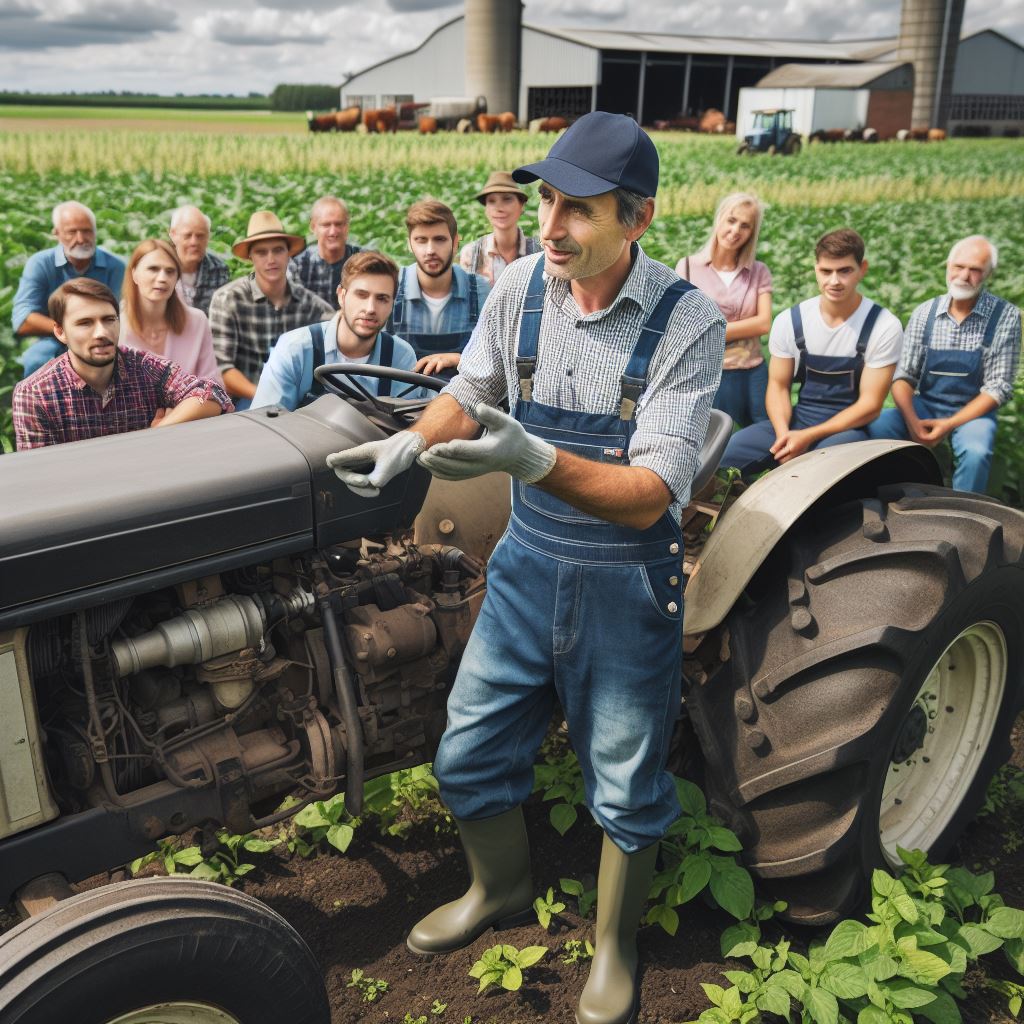Introduction
The organic food industry has gained immense popularity in recent years. Behind its pristine image lies a complex reality.
Many consumers are under the impression that organic food is produced using entirely natural and sustainable methods.
But is that really the case?
Organic farming begins with the selection of seeds, which are believed to be free from genetic modification.
However, the truth is that organic seeds can contain traces of genetically modified organisms (GMOs).
This compromise in purity raises questions about the authenticity of the “seed to table” process.
Organic farmers rely heavily on pesticides derived from natural sources to protect their crops.
While these pesticides may be less harmful than their synthetic counterparts, they can still harm beneficial insects and wildlife. This contradicts the notion of organic farming being truly eco-friendly.
In addition, the journey from farm to table is often longer for organic produce, resulting in increased carbon emissions due to transportation.
The large-scale distribution of organic products may not align with the sustainable and local ideals of the movement.
Basically, the “seed to table” narrative surrounding organic food is not entirely accurate.
The use of potentially GMO-contaminated seeds, the limited effectiveness of natural pesticides, and the environmental impact of long-distance transportation are factors that challenge the authenticity and purity of the organic industry.
As consumers, it is crucial to be aware of these realities and advocate for more transparency in the organic food market.
What is Organic Agriculture?
Definition of organic agriculture
Organic agriculture refers to a farming approach that prioritizes the use of natural methods and avoids synthetic substances.
Principles of organic farming
- Soil fertility: Organic farming focuses on maintaining and improving soil health through practices like composting and crop rotation.
- Ecological balance: It aims to preserve the biodiversity and enhance natural processes to sustain a healthy ecosystem.
- Minimal use of external inputs: Organic farming minimizes the use of synthetic fertilizers, pesticides, and genetically modified organisms (GMOs).
- Animal welfare: Organic agriculture promotes the ethical treatment and well-being of animals involved in the farming process.
Key characteristics of organic produce
- No artificial chemicals: Organic produce is cultivated using natural fertilizers and pest control methods, avoiding synthetic chemicals.
- Non-GMO: Organic crops do not contain genetically modified organisms, ensuring their purity and natural characteristics.
- Environmental sustainability: Organic farming practices prioritize the preservation of the environment and natural resources.
- Nutritional value: Organic produce is known to have higher levels of essential nutrients and antioxidants compared to conventionally grown foods.
Growing popularity of organic food
- Health consciousness: Consumers are increasingly aware of the potential health risks associated with consuming synthetic chemicals.
- Environmental concerns: Organic agriculture helps protect soil, water, and air quality, appealing to environmentally conscious individuals.
- Taste and quality: Many people believe that organic food tastes better and offers superior quality compared to conventionally produced food.
- Support for local farmers: Purchasing organic food supports local farmers and encourages sustainable practices in the agricultural sector.
Principles of organic farming
In recent years, the demand for organic food has surged, reflecting a shift towards healthier and more sustainable lifestyles.
Transform Your Agribusiness
Unlock your farm's potential with expert advice tailored to your needs. Get actionable steps that drive real results.
Get StartedOrganic agriculture stands as a viable alternative to conventional farming practices that heavily rely on artificial inputs.
By prioritizing soil health, ecological balance, and minimal use of external inputs, organic farming ensures the production of high-quality, nutrient-rich produce.
Key characteristics of organic produce
The key characteristics of organic produce, such as the absence of artificial chemicals and GMOs, further attract consumers who seek healthier food options.
Organic farming also aligns with the growing environmental concerns as it promotes sustainability and reduces the negative impact on the ecosystem.
Organic food enthusiasts often advocate for the superior taste and quality of organic produce.
The absence of synthetic chemicals is believed to enhance the natural flavors and nutritional value of the food.
Consequently, organic food is embraced by individuals who prioritize taste and overall food quality.
Growing popularity of organic food
In addition to personal health and environmental awareness, the popularity of organic food also stems from the support it offers to local farmers.
By choosing organic options, consumers contribute to the growth of local economies and encourage small-scale farmers to adopt sustainable farming practices.
Generally, organic agriculture encompasses a set of principles and characteristics that distinguish it from conventional farming methods.
As the demand for healthier, more sustainable food options continues to rise, organic farming plays a crucial role in meeting these needs.
From its commitment to soil fertility and ecological balance to its focus on natural inputs and animal welfare, organic agriculture provides a viable solution for a more sustainable and nutritious food system.
Read: Traceable Eats: Knowing Your Food’s Story
Organic Certification and Regulations
Importance of organic certification
- Organic certification provides credibility and ensures the authenticity of organic products.
- Consumers can trust that certified organic products meet strict standards and are free from harmful chemicals.
- It helps consumers make informed choices and supports their desire for healthy and sustainable options.
- Organic certification promotes environmental conservation and promotes farming practices that protect biodiversity.
Overview of organic certification process
- Organic certification involves a rigorous evaluation of the entire production process, from seed to table.
- Farmers must comply with specific requirements, such as using organic seeds and avoiding synthetic pesticides.
- The certification process includes record-keeping, inspections, and verification of organic practices.
- Certification agencies assess the compliance and issue organic certificates to eligible farmers and processors.
Government regulations for organic farming
- Government regulations ensure that organic farming practices meet certain standards and are consistent.
- Many countries have established specific laws and regulations to guide and regulate organic agriculture.
- These regulations define what is considered organic, including prohibited substances and allowed production methods.
- Governing bodies enforce these regulations through inspections and audits.
Role of third-party organizations
- Third-party organizations play a crucial role in the organic certification process and maintaining its integrity.
- These organizations are independent and unbiased, ensuring a reliable assessment of organic practices.
- They perform inspections, review documentation, and verify compliance with organic standards.
- Third-party organizations work as intermediaries between farmers, consumers, and certification agencies.
Essentially, organic certification and government regulations are essential components of the organic industry.
Certification provides consumers with confidence and empowers them to make educated choices about the food they consume.
Through a meticulous evaluation process, organic certification ensures that organic products are genuinely produced and free from harmful chemicals.
Government regulations further reinforce the standards and practices necessary for organic farming.
By enforcing these regulations, governing bodies ensure the consistency and integrity of the organic sector.
Third-party organizations play a vital role in maintaining trust and accountability throughout the certification process.
Their independent assessments provide unbiased validation of organic practices, bridging the gap between farmers and consumers.
Together, these factors contribute to a robust and trustworthy organic industry that supports sustainability, health, and environmental well-being.
Read: Eating Local: A Deep Dive into Benefits
The Seed: Foundation of Organic Farming
Importance of using organic seeds
- Organic seeds are crucial in maintaining the integrity and authenticity of organic farming.
- They ensure that the produce grown is truly organic, free from synthetic fertilizers or pesticides.
- Organic seeds carry the genetic potential to develop robust and resilient plants, suited for organic conditions.
- Using organic seeds also supports biodiversity and the preservation of heirloom varieties.
Challenges in sourcing organic seeds
- The availability of organic seeds is limited compared to conventional seeds.
- Many seed companies focus more on conventional varieties, making it harder to find organic options.
- Sourcing organic seeds can be challenging due to higher costs and limited distribution networks.
- Organic seed suppliers often face difficulties in meeting the increasing demand for organic seeds.
Solutions for obtaining organic seeds
- Encouraging and supporting local farmers and seed savers who specialize in organic varieties.
- Joining or starting organic seed saving groups or cooperatives to exchange and share organic seeds.
- Collaborating with organic farming organizations or associations that promote organic seed production.
- Investing in research and development to improve organic seed production techniques and availability.
Benefits of using organic seeds in organic farming
- Organic seeds help maintain the organic integrity of the entire farming process.
- They adapt better to organic growing conditions, resulting in healthier and more vigorous plants.
- Organic seeds contribute to the development of resilient crop varieties that can withstand pests and diseases naturally.
- Using organic seeds helps support sustainable farming practices and preserve genetic diversity.
In general, organic seeds play a vital role in the foundation of organic farming.
They ensure the authenticity and integrity of organic produce, contribute to biodiversity, and support sustainable agricultural practices.
Showcase Your Farming Business
Publish your professional farming services profile on our blog for a one-time fee of $200 and reach a dedicated audience of farmers and agribusiness owners.
Publish Your ProfileDespite the challenges in sourcing organic seeds, there are solutions available, such as supporting local farmers and seed savers and collaborating with organic farming organizations.
The benefits of using organic seeds in organic farming are numerous, including healthier plants, resilience against pests and diseases, and the preservation of genetic diversity.
By prioritizing the use of organic seeds, farmers can truly embody the principles of organic agriculture and contribute to a more sustainable food system.
Read: Farm to Table: The Transparency Revolution
The Soil: Nurturing Organic Crops
Organic soil management techniques
- Crop rotation: Alternating different crops in the same area to prevent soil depletion.
- Cover cropping: Planting cover crops like legumes to fix nitrogen and improve soil structure.
- Composting: Recycling organic waste to create nutrient-rich compost for the soil.
- Mulching: Using organic materials like straw or leaves to cover the soil and reduce evaporation.
Significance of soil quality in organic farming
- Healthy soil supports root development, leading to stronger and more productive plants.
- Balanced soil pH and nutrient levels enhance the plant’s ability to resist diseases.
- Improved soil structure increases water-holding capacity and reduces erosion risks.
- Rich organic matter in the soil stimulates beneficial microbial activity and promotes biodiversity.
Natural fertilizers and soil amendments
- Compost: Adds nutrients, improves soil structure, and enhances water-holding capacity.
- Manure: Provides essential nutrients and organic matter, enhancing soil fertility.
- Bone meal: High phosphorus content promotes root development and flowering.
- Seaweed extract: Rich in trace minerals and growth-promoting substances for plant health.
Sustainable pest and weed control methods
- Biological pest control: Introducing natural predators or parasites to control pest populations.
- Crop rotation: Disrupts pest life cycles and reduces their ability to establish in the soil.
- Mulching: Suppresses weed growth by blocking sunlight and reducing seed germination.
- Hand weeding: Manual removal of weeds, minimizing the use of herbicides and promoting organic practices.
Organic soil management techniques
Organic farming emphasizes the importance of soil management techniques to ensure the health and productivity of crops.
By implementing organic practices, farmers can improve soil quality, enhance plant growth, and minimize environmental impact.
Crop rotation
One key technique is crop rotation, which involves alternating different crops in the same area.
This practice helps prevent soil depletion by preventing the buildup of pests and diseases specific to individual crops.
Additionally, it allows for the replenishment of essential soil nutrients, reducing the need for synthetic fertilizers.
Cover cropping
Cover cropping is another effective method used in organic farming.
By planting legumes such as clover or vetch, farmers can fix nitrogen from the air and enrich the soil naturally.
These legumes also improve soil structure, reducing compaction and erosion while increasing water infiltration rates.
Composting
Composting is a widely used practice in organic farming, where organic waste materials such as kitchen scraps, crop residues, and animal manure are decomposed to create nutrient-rich compost.
This compost acts as a natural fertilizer, supplying vital nutrients to the soil and enhancing its overall health.
It also improves soil structure, water-holding capacity, and microbial activity.
Natural fertilizers and soil amendments
Using organic fertilizers and soil amendments is crucial in organic farming.
Compost, with its diverse nutrient content, is an excellent choice.
Manure, derived from organic sources, not only supplies nutrients but also improves soil fertility.
Other natural amendments like bone meal and seaweed extract contribute specific nutrients and trace minerals to support plant growth.
Sustainable pest and weed control methods
Biological control
Addressing pest and weed control in organic farming involves more sustainable methods.
Biological control relies on natural predators or parasites to keep pest populations in check.
Introducing beneficial insects, like ladybugs, can control aphids, while nematodes combat root pests.
This approach minimizes the need for chemical pesticides and promotes a balanced ecosystem.
Mulching
Mulching is another effective technique for weed control.
By covering the soil with organic materials like straw or leaves, weeds are suppressed, reducing competition for nutrients and water.
Mulching also helps regulate soil temperature and conserves moisture, benefiting the growth of organic crops.
In some cases, hand weeding becomes necessary.
While labor-intensive, it provides precise control over weeds and avoids the use of herbicides.
Farmers must remove weeds before they compete with crops for resources and prevent them from going to seed.
In short, soil management techniques play a vital role in organic farming.
By employing practices like crop rotation, cover cropping, composting, and mulching, farmers can nurture organic crops while conserving soil health.
Implementing sustainable pest control methods and adopting targeted weed control techniques further supports organic principles.
Through these organic soil management practices, we can foster a truly sustainable and environmentally-friendly agricultural system.
Read: Organic Eats: Beyond the Label in Farming

The Crop: Organic Farming Practices
Crop rotation and diversity
Organic farming practices prioritize the health of the soil, plants, animals, and the environment as a whole.
Crop rotation and diversity play a crucial role in maintaining the long-term fertility and health of the soil.
By rotating crops, farmers can reduce the risk of pest and disease buildup and prevent soil nutrient depletion.
Composting and nutrient cycling
In addition to crop rotation, organic farmers utilize composting and nutrient cycling as a means to enrich the soil.
Composting involves the decomposition of organic materials, such as crop residues and animal manure, to create nutrient-rich compost.
This compost is then spread onto the fields, providing the plants with essential nutrients and improving the soil structure.
Showcase Your Farming Business
Publish your professional farming services profile on our blog for a one-time fee of $200 and reach a dedicated audience of farmers and agribusiness owners.
Publish Your ProfileOrganic pest and disease management
Organic farmers rely on organic pest and disease management practices.
Instead of using synthetic chemicals, they employ integrated pest management techniques.
This includes using beneficial insects, such as ladybugs and praying mantises, to control harmful pests.
Crop rotation is also used to break pest life cycles, while trap crops lure pests away from the main crops.
Ethical animal husbandry practices
In organic farming, ethical animal husbandry practices are a vital component.
Livestock raised on organic farms are given access to pasture and clean water, promoting their natural behavior and overall well-being.
The use of hormones and antibiotics is strictly prohibited, ensuring that animals are not subjected to unnecessary drugs.
Organic farming practices encompass crop rotation and diversity, composting and nutrient cycling, organic pest and disease management, and ethical animal husbandry practices.
These sustainable methods prioritize the long-term health of the soil, the production of nutrient-rich crops, and the welfare of animals.
By adhering to these practices, organic farmers are able to provide consumers with truly organic and sustainable products.
The Harvest: Maintaining Organic Integrity
Proper harvesting techniques for organic crops
- Harvesting organic crops at the peak of maturity to ensure maximum flavor and nutritional value.
- Avoiding the use of synthetic chemicals during harvesting, such as chemical sprays or growth regulators.
- Using safe and approved tools and equipment to minimize any potential damage to the crops.
- Implementing careful manual harvesting methods to prevent contamination and bruising of the produce.
Post-harvest handling and storage for organic produce
- Properly cleaning and sanitizing all equipment and storage containers used for handling organic produce.
- Maintaining optimal temperature and humidity conditions for different types of organic produce during storage.
- Utilizing natural and organic methods for preserving freshness, such as using breathable packaging materials.
- Regularly inspecting stored organic produce for any signs of spoilage or pest infestation.
Minimizing contamination risks during transportation
- Using dedicated transportation vehicles specifically designated for organic produce to avoid cross-contamination.
- Ensuring that transportation containers are thoroughly cleaned and sanitized before loading organic produce.
- Implementing proper handling procedures during loading, unloading, and stacking of organic produce to prevent damage and contamination.
- Regularly monitoring transportation conditions, such as temperature and humidity, to preserve organic integrity.
Ensuring organic integrity in processing and packaging
- Using certified organic processing facilities that adhere to strict organic standards and regulations.
- Prohibiting the use of synthetic additives, preservatives, or genetically modified organisms (GMOs) in the processing of organic products.
- Implementing rigorous quality control measures to detect and eliminate any non-organic substances during processing.
- Employing sustainable and eco-friendly packaging materials that are free from harmful chemicals and materials.
By carefully following these guidelines and practices, organic farmers and producers can maintain the integrity of their organic crops from seed to table.
It ensures that consumers receive truly organic products that are not only healthier but also environmentally sustainable.
The Table: Understanding Organic Labels
Different organic labels and their meanings
- USDA Organic: Indicates that the product has been produced and processed according to the USDA’s standards.
- 100% Organic: All ingredients in the product are organic and no non-organic substances are used.
- Organic: At least 95% of the ingredients in the product are organic, with strict restrictions on non-organic substances.
- Made with Organic Ingredients: Contains at least 70% organic ingredients, with the remaining 30% meeting specific criteria.
- Some Organic Ingredients: Indicates that less than 70% of the product’s ingredients are organic.
Controversies surrounding labeling standards
- Loopholes: Some critics argue that labeling standards have loopholes that allow non-organic products to be labeled as organic.
- Lack of enforcement: The limited resources dedicated to enforcing organic labeling standards raise concerns about their effectiveness.
- Confusion among consumers: The varying degrees of organic labels often confuse consumers, leading to misconceptions about organic products.
Importance of reading organic labels as a consumer
Reading organic labels helps consumers make informed choices and understand the quality and authenticity of the products they consume. It allows them to:
- Ensure organic integrity: By checking labels, consumers can verify if the product meets their expectations of organic standards.
- Avoid harmful chemicals: Organic labels provide assurance that the product has been produced without synthetic pesticides, hormones, or GMOs.
- Support sustainable practices: Consumers can choose products labeled with environmentally friendly certifications, contributing to a greener future.
- Meet dietary preferences or restrictions: Understanding labels helps individuals with specific dietary needs, such as gluten-free or vegan diets.
Supporting local organic farmers
By buying products with local organic labels, consumers can:
- Promote local economy: Supporting local farmers helps sustain their livelihoods and preserves agricultural diversity in the community.
- Reduce environmental impact: Locally sourced foods require fewer transportation resources, decreasing carbon emissions and supporting a healthier planet.
- Connect with food sources: Purchasing from local farmers allows consumers to establish a closer relationship with the origins of their food and experience seasonal variety.
- Enjoy fresher and healthier options: Local organic farmers often prioritize freshness and crop diversity, providing consumers with nutritious and flavorful products.
In a nutshell,, understanding organic labels is vital for consumers to make conscious choices and support organic farming practices.
Reading labels allows individuals to verify the authenticity and quality of products, avoid harmful chemicals, meet dietary preferences, and contribute to sustainable agriculture.
Additionally, supporting local organic farmers benefits the local economy, environment, and personal well-being.
So, take the time to read and interpret those labels and help create a healthier and more sustainable food system.
Explore Further: Aquaponics: Future of Farming?
Conclusion
Recap of the key points discussed
Throughout this blog post, we have explored the story of organic farming, from the seed to the table.
We learned about the importance of organic farming and the benefits it brings to both our health and the environment.
Reiteration of the importance of organic farming
It is crucial to understand that organic farming methods preserve soil quality, conserve water, and promote biodiversity.
By choosing organic products, we support sustainable agriculture and protect ourselves from harmful chemicals.
Encouragement to choose organic products
Now that we know the truth behind the organic label, let’s make conscious choices when purchasing food.
Opt for organic produce, dairy, and meat to ensure you’re consuming food that is free from synthetic pesticides, antibiotics, and hormones.
Closing thoughts or call to action
As consumers, we have the power to drive change and demand more organic options.
Let’s support local farmers who embrace organic farming practices and fight against the negative effects of conventional agriculture.
Together, we can create a healthier, greener, and more sustainable food system for future generations.
In the end, the journey from seed to table in organic farming is not just a tale, but a reality.
So, let’s make the choice to support organic agriculture and secure a better future for ourselves and our planet.




